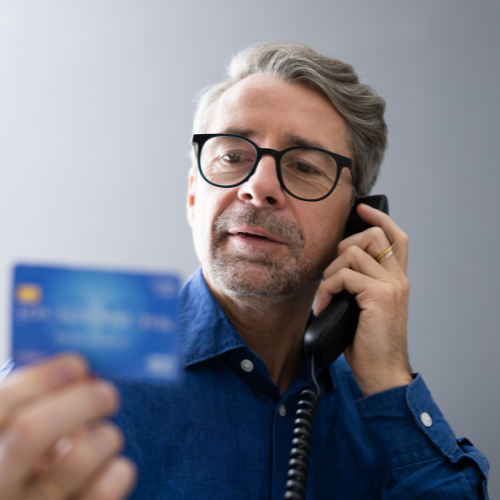Phone-based financial fraud continues to be one of the most common and costly crimes in the US. Scammers use convincing voices, fake caller IDs, and emotional manipulation to steal money or personal information.
The good news? A landline call blocker can significantly reduce these risks—helping protect you, your family, and your finances.

How Does Financial Fraud Happen Over the Phone?
Fraudsters impersonate trusted organizations or create fake emergencies to trick people into revealing sensitive details. Common scams include:
- Bank or credit card fraud calls (“We’ve detected suspicious activity on your account”).
- IRS scams demanding immediate payment.
- Social Security or Medicare fraud requests for ID numbers.
- Investment scams offering unrealistic returns.
- Tech support scams charging fees to “fix” non-existent problems.
According to the FTC, Americans lost over $10 billion to phone-related fraud in 2024—with landline users particularly vulnerable.
Summary: Phone scammers impersonate trusted institutions to pressure victims into revealing financial information or sending money.
Why Landlines Are High-Risk for Scams
Landline users, especially older adults, remain prime targets because:
- Caller ID spoofing makes fake numbers look legitimate.
- Many landline users trust incoming calls more than mobile ones.
- Landlines provide a direct communication path with no spam filters.
Summary: Landlines give scammers direct, unfiltered access to victims—especially seniors.
How Do Landline Call Blockers Prevent Financial Fraud?
Call blockers such as CPR Call Blocker V5000 and V100K act as a physical firewall between scammers and your phone.
They:
- Automatically block known scam numbers using a preloaded database.
- Filter out international and withheld calls.
- Allow only trusted numbers through whitelist mode.
- Give one-touch manual blocking for new offenders.
- Log call attempts, allowing family oversight.
Independent studies and user data show up to a 95% reduction in scam calls after installation.
Summary: Call blockers automatically filter scam numbers, reducing the likelihood of financial fraud dramatically.
Real-World Example
A couple in Arizona received repeated fake “bank security” calls. After installing a CPR Call Blocker, the calls stopped within days. Reviewing the logs showed dozens of blocked attempts—each from different spoofed numbers linked to known scam networks.
Summary: Users regularly report an immediate drop in fraudulent call attempts once call blockers are installed.
Additional Ways to Strengthen Phone Fraud Protection
- Register your number on the Do Not Call Registry.
- Use a call blocker with both preloaded scam numbers and manual blocking.
- Enable Caller ID with your carrier.
- Never share bank or card details by phone.
- Report phone scams to the FTC or local authorities.
Summary: Pairing a call blocker with awareness and reporting creates strong financial fraud protection.
Why Seniors Benefit Most from Call Blockers
Elderly Americans are often the biggest targets of financial fraud due to trust, politeness, or memory decline. Call blockers:
- Stop scammers before they make contact.
- Reduce stress and confusion.
- Protect pensions, savings, and personal data.
- Give caregivers peace of mind.
Summary: Call blockers provide an essential shield for seniors, preventing financial exploitation and emotional harm.

Conclusion
Phone-based financial fraud can devastate victims—but prevention is simple. A landline call blocker adds a powerful layer of protection, preventing scammers from ever reaching your phone and giving you peace of mind every time it rings.
Explore our range call-blocking devices to protect your loved ones today.
FAQs
Q: Can a call blocker completely stop fraud?
A: It can stop nearly all scam calls and reduce overall risk, but vigilance is still key.
Q: Do I need internet for a call blocker?
A: No, they connect directly to your landline.
Q: Will it block legitimate calls?
A: Only if the number is unfamiliar—whitelist trusted contacts to ensure safe access.
Q: Are call blockers legal?
A: Yes, and they’re supported by the FCC under the TRACED Act.



